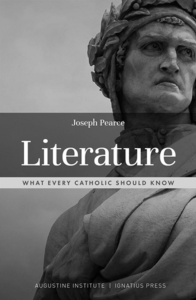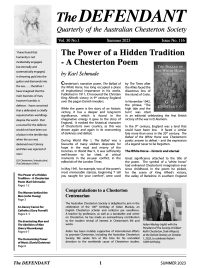Joseph Pearce’s conspectus of Catholic literature across the ages, Literature: What Every Catholic Should Know (Ignatius Press and Augustine Institute, 2019) is reviewed by the Australian Chesterton Society’s Secretary-Treasurer, Gary Furnell.

Every book I review I read twice. This book is easy to read twice because it’s short and packed full of helpful information. In addition, it’s well written and its perspective is unapologetically orthodox.
Joseph Pearce introduces his book by stating his reason to read great literature:
“There is a very good reason for every Catholic to know the great works of literature — and that is because the great works of literature help us to know ourselves. This is the reason that we should learn about the humanities — because the humanities teach us about humanity, both our own humanity and the humanity of our neighbours.”

I’d add another reason: when we read the literature of past centuries, we discover that the conditions, the customs and moralsofouragearepeculiar—whereaswetendtothinkof them as normal.
For example, when we read Jane Austen’s magnificent novels, we discover that courtship was conducted very differently—and a lot more sensibly—than in our age. If we only read contemporary novels we’ll miss this and many other similar insights. We’ll suffer the indignity of being children of our age, rather than prudent students of every age and thereby able to see our own age with greater clarity.
Pearce differentiates between literature that presents mankind as homo viator, a pilgrim traversing earth while heading for eternity, and homo superbus, the proud person who mistakenly presumes total autonomy.
The ancient world’s literature chronicled the struggle between these two humanities, with deep sympathy for homo viator. The literature of Christendom saw the vindication of homo viator and the condemnation of homo superbus. Our own age has seen the neglect of homo viator and the affirmation of homo superbus, but it’s a troubled affirmation because — while dull in some ways—we can see that assuming autonomy and dismal dysfunction are somehow entwined.
Contrasts explored in the ancient classics
Literature: what every Catholic should know starts with the ancient classics by Homer, Virgil and Sophocles.
Homer’s two epics, The Iliad and The Odyssey explore the struggles between honourable heroes and their dishonourable protagonists, with the gods mysteriously active to frustrate the reckless and the arrogant. Virgil’s epic The Aeneid follows a similar strain. In both Homer’s and Virgil’s epics, duty is contrasted with selfishness, and rage is contrasted with prudence.
Sophocles’ plays continue this contrast. In Antigone filial duty is affirmed above political edicts or expediency. His Oedipus plays explore notions of guilt, suffering and growth in wisdom. Pearce contrasts the realities presented in Sophocles’ two Oedipus plays with Sigmund Freud’s aberrant reading of the Oedipus story. Pearce reminds us that the pre-Christian writers assumed objective moral realities and the potency of truth. They searched with dignity towards the sagacity more fully revealed by Christianity.
Pearce notes that Christianity ratifies story-telling. For a story-writer, it’s an immense encouragement to imagine and create:
“What God has done in the telling of his story in history and in the telling of fictional stories in his parables is sanctify story itself. Storytelling is God’s chosen method of telling the truth. This being so, we can see how our stories, in their own small way, can also be conveyors of truth, and we can see how the Christian era has breathed new life into literature by sanctifying the role of storytelling.”
Along with his discussion of early English stories like Beowulf, Joseph Pearce — as he does throughout the book — highlights poems that have been neglected but are of the highest quality. This is one of the real benefits of his book: it’s an extension of the familiar to include the forgotten.
Other benefits include the insights attending the literary discussion. For example, a primitive writer is not necessarily a barbaric writer. A primitive writer appreciates prime — important — matters whereas a barbaric writer is not likely to appreciate prime matters, instead focusing on faddish or secondary matters.
Dante, Chaucer, Shakespeare, Cervantes
Dante gets a chapter to himself, as does Chaucer. Both men were religious story-tellers in poetry. Dante’s classic poem had a supernatural setting whereas Chaucer’s setting was the English countryside. Chaucer’s characters are exemplars of homo viator — humanity on pilgrimage — but Chaucer shows us that it’s the interior pilgrimage that is crucial.
Participating in religious activities is never sufficient by itself for commendation. Pearce observes: “To see as Chaucer sees is not merely to see reality as a late mediaeval Englishman saw it, but to see reality as it is.”
Thomas More also gets a chapter to himself but that’s partly because he initiated what developed into a great tradition: exploring utopias and dystopias through novels. It’s become a staple of movies too. Pearce notes:
“In being shown these cautionary scenarios of the way things could be (dystopia), we are inspired to a better understanding of what they should be. It goes without saying that our understanding of what is good determines our understanding of what is a good society. If we have a false and fallacious understanding of the good, our utopian dreams will metamorphose into dystopian nightmares.”
Shakespeare and Cervantes are rightly celebrated. Shakespeare wrote many masterpieces, Cervantes only one — Don Quixote — but the influence of their works has been profound. Don Quixote excites our humour and compassion because we enjoy seeing a man determined to help and act honourably, but in a blundering way.
Shakespeare, in play after play, subtly uncovers the struggle between people — and more importantly the struggle within individual characters — of virtue and mendacity.
Poets are honoured, as you would expect. The English metaphysical poets, followed by Milton and Dryden; and the Romantic poets together with Gerard Manley Hopkins, Francis Thompson, Siegfried Sassoon and T.S. Eliot are highlighted.
I again benefitted from Pearce’s insights, including his reminder that many agnostic or troubled writers — like Charles Baudelaire and Oscar Wilde, championed by today’s secularists — found refuge in the Church in the later period of their lives.
Other poets are more briefly discussed, including Pushkin, Baudelaire, Paul Claudel and William Blake. I assume space constraints were the only reason why skilful poets with a religious orientation like W.H. Auden, E.E. cummings or R.S. Thomas are not mentioned.
The novels of Jane Austen, the Bronte sisters and Mary Shelley are examined, with Jane Austen rightly described as a genius. She was a shrewd moral philosopher, and a sublime artist with a bright talent for comedy.
The focus on the great Russian writers is welcome. It’s a blessed person who reads Tolstoy, Gogol, Dostoyevsky, Turgenev, Pasternak, Solzhenitsyn and Chekhov when young, and then re-reads them at a more mature age. These writers seem to be in an exalted class of their own. Joseph Pearce introduces some of these writers, but all of them are of the highest quality.
Turgenev’s novel Fathers and Sons (to pick just one), and his short story collection Sketches from a Hunter’s Album are outstanding works of fiction, while Chekhov’s best short stories portray the imbroglios we get ourselves into when we have no firm moral ground and we’re bored or lazy.
Pasternak’s masterpiece Doctor Zhivago deserves to be read alongside Solzhenitsyn’s books for added insight into the difficulties of living decently when merciless ideologues are in control.
I’ve somewhat neglected nineteenth century American literature. I haven’t read Uncle Tom’s Cabin but I intend to read it based on Pearce’s assessment of its importance. And I was unaware of Mark Twain’s book on Joan of Arc until I learned of it here. That’s another benefit of this introduction to literature: I know now about lots of books I may have otherwise overlooked.
The French and English twentieth century Catholic writers are more familiar. Francois Mauriac, Georges Bernanos, Evelyn Waugh, Belloc, Chesterton, Graham Greene, R.H. Benson and Maurice Baring form a powerful witness to the excellence of Christian artistry. They’re among the finest novelists of any age.
One could add Elizabeth Goudge and Barbara Pym to this list. Goudge’s novels are brimming with engaging characters, and she writes about children with really brilliant perception. Barbara Pym’s gentle comedies never fail to please; she sees our frequent ridiculousness and laughs at it but without misanthropy.
Norwegian novelist Sigrid Undset will be unfamiliar to many. She wrote historical sagas as well as contemporary dramas. She championed individual responsibility and mature judgement; virtues she knew were gained more often through suffering than sheer will-power. Flannery O’Connor, an American Catholic writer, shared a similar perspective, but her stories are shorter and more frequently witty.
C.S. Lewis and J.R.R. Tolkien conclude the book. Widely popular, their influence on fantasy fiction is unrivalled.
As we enter a strange neo-pagan era, the need for popular Catholic art will be as great as ever. Literature: What Every Catholic Should Know champions the gifted artists whose works the next generations of writers will need to study.
